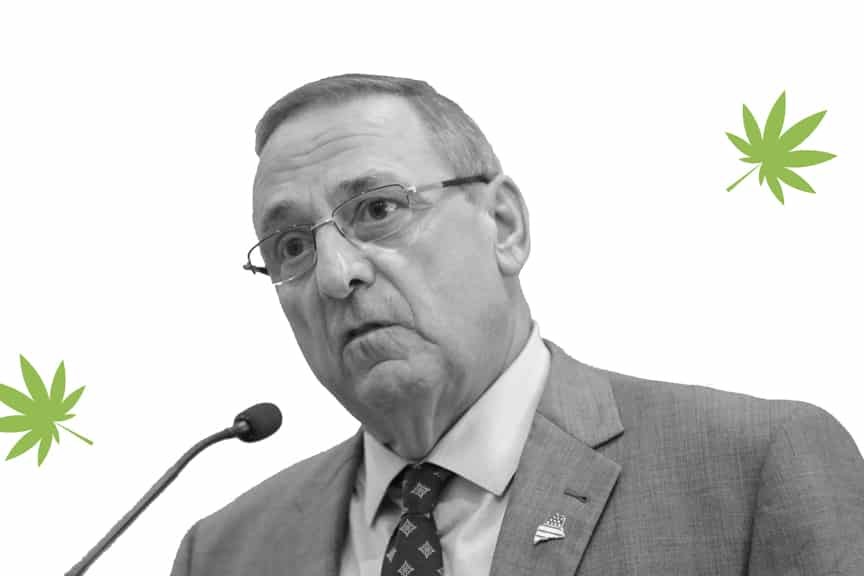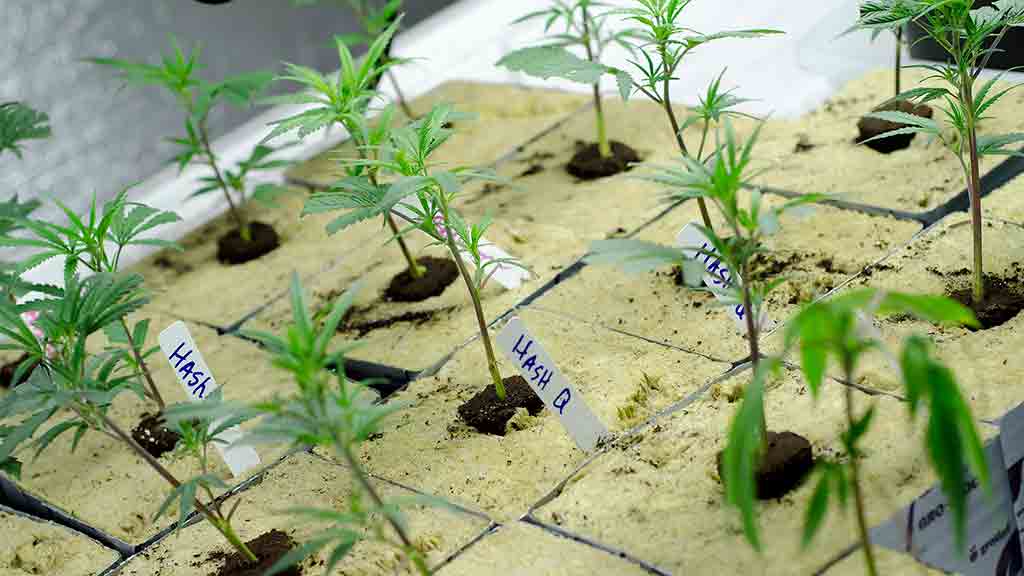Maine Gov vetoes (admittedly flawed) legal cannabis bill, leaving future sales uncertain
On Friday, November 3, 2017, Maine Governor Paul LePage (R) vetoed legislation to regulate cannabis sales in the state.

Psymposia is a 501(c)(3) nonprofit research and media organization that offers critical perspectives on drugs, politics, and culture. We rely on contributions from our readers and listeners. Your support is vital to sustaining Psymposia.
Support Psymposia’s independent journalism on Patreon and help us drive the Mystery Machine! We’re a bunch of meddling kids who are unmasking the latest shenanigans on the psychedelics beat.
On Friday, November 3, 2017, Maine Governor Paul LePage (R) vetoed legislation to regulate cannabis sales in the state. This came after the legalization initiative ‘Yes on 1’ passed by popular vote in November 2016, and after a bill to implement commercial sales passed the state’s House of Representatives and Senate last month.
The Marijuana Legalization Act (LD 1650), a rewrite of the ballot-box law passed by Maine voters, first passed in the state legislature October 23, 2017 by a vote of 22-9 in the Senate—a veto-proof majority. Though it also passed in the House, it fell short of a veto-proof majority. On Monday, November 6, the state legislature met to vote again on the bill, but the House vote of 74-62 again fell short of overriding the governor’s veto.
In a letter to lawmakers, LePage cited his concerns about conflict between state and federal cannabis law. “Until I clearly understand how the federal government intends to treat states that seek to legalize marijuana, I cannot in good conscience support any scheme in state law to implement expansion of legal marijuana in Maine,” he said. He added that before Maine proceeds with implementing legal cannabis, “we need assurances that a change in policy or administration at the federal level will not nullify those investments.”
LePage’s also cited the state’s opioid crisis as a reason for his veto. “The dangers of legalizing marijuana and normalizing its use in our society cannot be understated,” he said. “Maine is now battling a horrific drug epidemic that claims more than one life a day due to overdoses caused by deadly opiates. Sending a message, especially to our young people, that some drugs that are still illegal under federal law are now sanctioned by the state may have unintended and grave consequences.” LePage seems to have missed reports that opioid overdoses decreased by 6% in the 2 years following implementation of legal adult-use cannabis markets in Colorado.
LePage claimed legal cannabis would increase violent crime and traffic fatalities in Maine. However, this has not been the case in other states. Violent crime decreased 6% in Colorado between 2009 and 2014. [ref] According to the Brennan Center for Justice, Colorado experienced a crime-rate increase in 2016 11 times the average of 0.3% in the nation’s 30 largest cities, with about 1 in 3 homicides committed in Denver. The Colorado Bureau of Investigations did not offer an analysis of why crime increased, drawing no direct correlation to cannabis legalization, as LePage implies. [/ref] Crime decreased in Washington and remained level in Oregon after they each legalized cannabis. Cannabis-related DUIs also decreased 33% in Colorado this year. This raises the question of whether LePage is lying or merely stupid.
After the Yes on 1 initiative narrowly passed last year, the Maine legislature formed a special bipartisan committee to amend the cannabis law and implement it. The Joint Select Committee on Marijuana Implementation consisted of 17 different representatives and senators, both Democratic and Republican, who met throughout the year to negotiate and craft regulations.
Senator Roger Katz (R-Augusta), committee co-chairman, explained the necessity for Maine to keep moving forwards with sensible cannabis policy. “The legalization ship has sailed, the people have spoken,” he said. “It’s not about whether you voted for legalization. I certainly didn’t vote for it. [But] if we do not pass this bill, if we go back to an unchecked black market, we will go back to chaos. Who could want that?”

With LePage’s veto, the ballot-box law will remain in effect. Possession of up to 2.5 ounces of cannabis and 6 home-grown plants will remain legal. But a temporary moratorium on commercial cannabis sales in Maine is in place, meaning no Maine resident can buy or sell cannabis or set up a legal business. If the moratorium is not extended or another bill is not passed by February 2018, then commercial elements of the ballot-box law will take effect.
House Minority Leader Kenneth Fredette (R-Newport) sees LePage’s action as an opportunity to extend the commercial moratorium to January 2019. He expressed a desire to work towards better legislation. “We’re not trying to kill legalization, or stall it,” he said. “[To] me, more important than when we’re going to do it is how we’re going to do it. Let’s do it responsibly. Let’s do it right. It’s still a federally illegal drug, after all. If we’re going to go there, let’s do it with a consensus bill.”
The bill in its current form has proved divisive among both parties in the legislature, and even among supporters of cannabis legalization in Maine. Committee member Craig Hickman (D-Winthrop) opposed the bill for being too conservative towards home-grows, or cannabis that is grown for personal use on private land. Meanwhile Committee member Patrick Corey (R-Windham) opposed the bill for economic reasons, stating that its rigid commercial taxation system would not generate sufficient revenue for the state to cover the cost of implementation.
The bill, predictably, attracted opposition from groups like Smart Approaches to Marijuana (SAM). SAM applauded LePage for “vetoing legislation written by Big Marijuana that would simply enrich private profits at the expense of public health. The only people rushing to legalize are the companies deceiving the public about marijuana’s harms.” Senator Scott Cyrway (R-Benton) couched his opposition in even bleaker terms, claiming legalization would lead to a flood of underage use and impaired driving accidents. “We are on the brink of a disaster,” he said. “But if we act responsibly now, we can save Maine.” In fact, teenage use of cannabis in Colorado declined after legalization, again raising the question: Lying or stupid?
Legalize Maine, the group who pushed the Yes on 1 initiative, announced their opposition to the bill in October. They criticized its changes to the voter-approved law, including increased sales and excise taxes, removing drive-up, internet, and home delivery sales, and requiring municipalities to opt-in to the cannabis market. “A poor, rushed process got us to where we are today,” Legalize Maine’s Paul T. McCarrier said after LePage’s veto.
The legislature also declined on Monday to extend the moratorium on sales, putting them in a precarious position. They must reach consensus—to either pass a new bill or buy themselves more time—when they return to session in January.
Senator Katz expressed uncertainty about the future of cannabis markets in Maine. “We will regroup and we will sit around and try to figure out where the heck we go from here, and I hope somebody has some bright ideas because right now I don’t have any.”
Special thanks to Penelope Overton of the Press Herald in Maine for her extensive coverage of this local issue.
Hey! Before you go… Psymposia is a 501(c)(3) non-profit media organization that offers critical perspectives on drugs, politics, and culture. We strive to ask challenging questions, and we’re committed to independent reporting, critical analysis, and holding those who wield power accountable.
Our perspectives are informed by critical analysis of the systemic crises of capitalism that have directly contributed to the unmitigated growth of addiction, depression, suicide, and the unraveling of our social relations. The same economic elite and powerful corporate interests who have profited from causing these problems are now proposing “solutions”—solutions which both line their pockets and mask the necessity of structural change.
In order for us to keep unpacking these issues and informing our audience, we need your continuing support. You can sustain Psymposia by becoming a supporter for as little as $2 a month.





